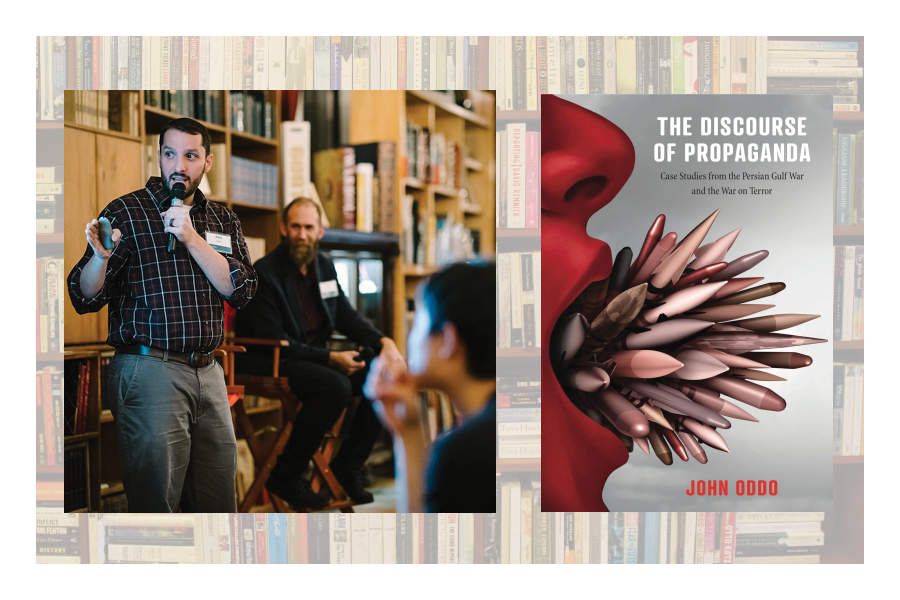
Professor John Oddo Publishes New Book on Political Rhetoric's "Game of Telephone"
By Angela Januzzi
While most Americans would prefer to believe they are not as susceptible to political propaganda as their fellow citizens, a new book by Carnegie Mellon University Associate Professor of English John Oddo argues those influences are far more complex than the public realizes. Published in November 2018, “The Discourse of Propaganda: Case Studies from the Persian Gulf War and the War on Terror” (Penn State University Press) argues “propaganda” is more than just misleading rhetoric generated by one person or group — but rather an elaborate process of keeping discourse alive and effective.
“We tend to think propaganda is generated by people with bad intentions—power-hungry officials who aim to manipulate the masses” says Oddo. “This is partially true: there are certainly powerful people who try to manipulate us. But one aim of the book is to show that propaganda doesn’t really spread unless lots of people work to keep it alive. It’s a bit like the telephone game where the fate of a message ultimately depends on the chain of people spreading it. Sure, the game might start with a power-hungry official, but that official can’t really win unless the people downstream repeat the original message faithfully. That’s when propaganda really works—when the people downstream keep it alive.”
Oddo also adds that propaganda is not just deliberately spread by institutions. “These people may have the best of intentions: they may be journalists, human rights workers, even ordinary citizens. But whoever’s responsible, it’s a problem when one message gets repeated to the point of domination…Ultimately democracy suffers.”
The book studies cases from the past few decades to show how successful wartime propaganda functions not as one-off concepts, but as ongoing processes. For instance, in the early 1990s, allegations emerged Iraqi soldiers removed infants from their incubators, causing the babies to die. These false reports helped justify the Persian Gulf War, just as spurious reports of weapons of mass destruction later undergirded support of the Iraq War in 2003.
Through analyzing both textual and visual rhetoric, as well as conditions that allow it to circulate, Oddo’s book traces how instances of propaganda are created, performed, and repeated in a wide arrange of formats: such as speeches, news reports, and everyday conversation.
How did he stay focused while compiling such an in-depth, research-heavy work? “It was pretty easy to stay motivated with this book just because the topic is so important to me,” says Oddo.
“I think war propaganda should be enormously important to everyone—the stakes are literally life-and-death. And the more I learned about how this disturbing propaganda came into existence, the more urgently I wanted to share what I learned. In some cases, the topic was so disturbing that, as I was writing, I found myself getting really angry. And I think this anger actually helped me to keep churning out the pages.”
Author Adam Hodges says Oddo’s new book holds important implications for “the harms of manipulative rhetoric”—and how we might protect democratic discourse from it.
--
Above: John Oddo presenting in New York City at The Strand Bookstore during the alumni #CMUThink event, October 2018; and the cover of his new book "The Discourse of Propaganda."